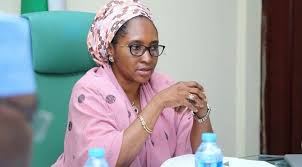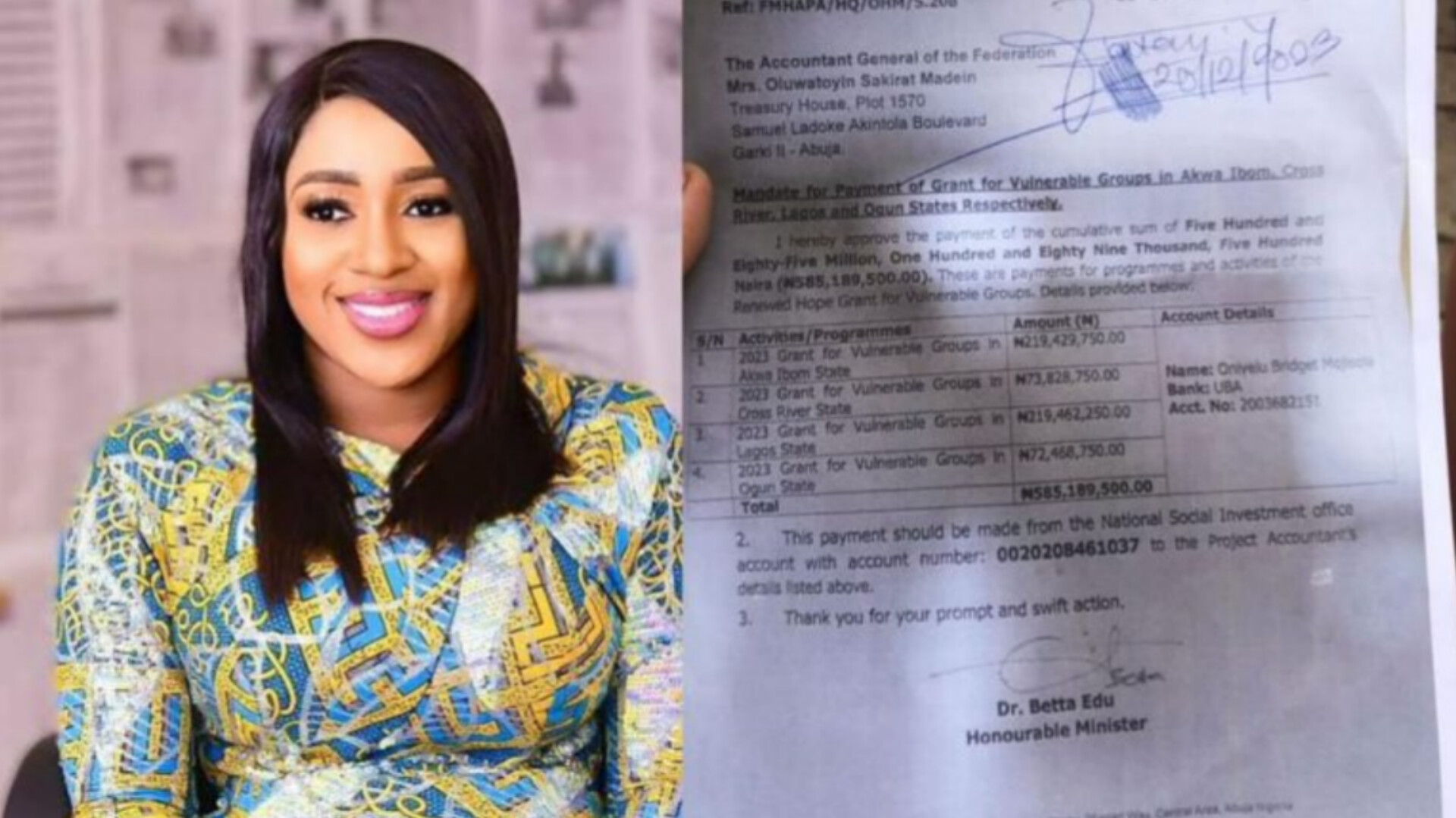The Minister of Finance, Budget and National Planning, Mrs Zainab Ahmed has been accused of awarding a revenue collection contract for the Federal Government to a foreign company currently being investigated for bribery, corruption and economic crimes in over 14 different countries.
The foreign firm, SICPA SA with its headquarters in Prilly, Switzerland, our investigations have revealed, has been variously indicted for heavily bribing government officials for contracts in the various countries where it operates and is even currently undergoing probe in several others.
Some of the 14 countries are Egypt, India, Kazakhstan, Pakistan, Senegal, Vietnam, Venezuela, Ukraine, Columbia and Brazil.

The company’s investigation, it was further learnt has been extended to various countries in addition to those mentioned above.
In furtherance of its investigations, Swiss security agents were said to have conducted a search on the company’s headquarters in Prilly in the suburbs of Lousanne, Switzerland in 2016.
It was also learnt that due to its involvement in large scale bribery and corruption, a Brazilian shutter on the company to wind down its operations in the country exists in addition to the confirmation of several other criminal procedures in progress against it.
Our correspondent learnt that SICPA SA made its foray into Nigeria in 2016 after Kibo Laboratories LLC, based in Washington DC, United States of America,
submitted an unsolicited proposal to the Federal Ministry of Finance, under the then Minister of Finance, Kemi Adeosun, for the Procurement, Development of an Electronic Tax Stamp and System for Tobacco and Alcoholic Beverages and Other Excisable Products under its tax and anti-contraband programme. It was learnt that Kibo LLC actually submitted the unsolicited proposal for a Public Private Partnership (PPP) to the Ministry, but the Ministry officials hijacked the firm’s initiative, inspite of the law regulating all PPP procurement clearly stating that contracts should be awarded on a “first come, first served” basis.
In June 2017, after the representatives of both SICPA SA and Kibo Laboratories LLC visited Nigeria on the invitation of the Federal Ministry of Finance and made presentations of their individual companies’ Automated Security Solutions of Track and Trace Systems to be deployed for excise tax collection, before the then Minister, both firms were recommended to the Bureau of Public Procurement (BPP) and their profiles forwarded for the BPP’s review and subsequent consideration for selective tendering for the Automation of Excise Tax collection.
The BPP subsequently granted Due Process “No Objection” Certificate to the Federal Ministry of Finance, as requested by the Ministry, to adopt Selective Procurement Method in favour of both SICPA SA and Kibo Laboratories LLC, in September 2017.
But corrupt Nigerian Ministry officials and SICPA SA allegedly hijacked the entire process and side lined Kibo Laboratories, which introduced the programme to the Ministry and initiated the entire procurement process.
Kibo Laboratories, it was learnt passed through all due processes for the contract with all relevant agencies, including the Nigeria Customs Service as evidenced by official documents obtained by our correspondent.
Suspicious of the entire process, Kibo Laboratories, through its lawyers, Tri-NASR Solicitors, Advocates and Legal Consultants, in November 2017, petitioned the Permanent Secretary, Federal Ministry of Finance, alleging “skewedness of the procurement process.” Kibo Laboratories lawyers also copied the petition to the Bureau of Public Procurement.
BPP in its response to the petition, placed the procurement process on suspension “until the Bureau settles the matter.” The BPP’s reply to the lawyers to Kibo Laboratories was signed by Engr Ishaq Yahaya, Director (Compliance, Certification and Monitoring) for the for the Bureau’s Director-General.
But corrupt Ministry officials recently again sold SICPA SA to the Minister of Finance, Mrs Zainab Ahmed as the only firm to execute the revenue collection contract.
The Swiss firm, it was gathered, is allegedly being used as a front by corrupt Ministry officials, to fleece the Federal Government of Nigeria, unknown to the Minister, who was said to have approved the contract for SICPA SA.
One of the Minister’s Special Advisers said to have featured prominently in all the “transactions” regarding the procurement, is said to be “major go-between” between the Federal Ministry of Finance officials and SICPA SA officials.
Following this latest development, Kibo LLC’s Executive Vice President, on June 8, 2022, fired another petition to the Finance Minister and other relevant Nigerian government officials on the procurement contract.
But while the Finance Minister has yet to respond to Kibo LLC’s latest petition, officials of the Federal Ministry of Finance, it was gathered, have been working assiduously underground to secure and perfect the contract for SICPA SA, the internationally indicted foreign firm that is fronting for them to fleece Nigeria of hard-earned revenue.
Some legal documents, including those of the Judiciary Section of Rio De Janeiro, 82 Federal Criminal Court, Federal Public Ministry, Brazil, sighted by our correspondent, indicated that SICPA SA has been indicted and is also undergoing multiple probe for bribery and corruption of public officials in the South American country.
In Switzerland, the owner of SICPA SA, Phillippe Amon, is also undergoing similar investigations for bribery, corruption and other economic crimes.
In Zurich, the Swiss capital, prosecutors of the Public Ministry of the Confederation (MPC) have extended “the corruption investigation launched in 2015 against the Vaud security ink specialist to the General Manager of the company.”
The SICPA SA owner is accused of “corruption of foreign public officials.”
The Prilly-based company has however declined to comment on a “Swiss procedure following its course.”
The Public Ministry’s investigation, it was learnt, concerns the alleged payment of bribes in various countries, “including Brazil and Columbia.”
Our correspondent gathered that the investigation launched by the prosecution targets SICPA SA, its owner and boss as well as a former employee.
Charges against a second employee were said to have been dropped in September 2020.
This legal development coincides with the signing by SICPA in Brazil of a “leniency agreement” involving the payment of a total amount of 762million Swiss Francs (USD135.5million) in fines and reimbursements, according to a press release published by the Vaud-based company. The payment will be spread over a period of 20 years.
The agreement signed with the Federal Comptroller General and the Federal Attorney General of Brazil, comes to sanction the irregularities noted in the contracts for services related to the beverage production control system (Sicobe).
Several investigations are also said to be underway to establish whether Amon, SICPA SA owner, who is also a security specialist, paid bribes.
Economic Crime
In Switzerland in the past six years, the company, SICPA Holding SA, has been under investigation by the Public Ministry of the Confederation, which suspects the firm of bribery of foreign public officials.
This investigation, it was gathered, was recently extended to the Managing Director and owner of the family company, Phillippe Amon.
The existence of criminal proceedings in progress against Amon, who is a specialist in security inks – supplier of the Swiss national Bank, employing some 2400 people worldwide and with a turnover estimated at one billion francs – has been known since 2019, it was learnt.
It was also learnt that the Swiss Public Ministry of Confederation (MPC) and SICPA have all confirmed the existence of an investigation targeting at least two people, including , for the MPC, that opened against Phillippe Amon, the owner of the firm.
Currently, various investigations exist in different countries seeking to establish whether SICPA SA and its owner, Phillippe Amon actually actively bribe officials in order to obtain contracts.
For instance, a case opened in Brazil had established that a former vice president of the company had paid $15million to a tax official for five years and had resulted in the conviction of the ex-employee of the company sentenced to 11 years and a half in jail.
The procedure opened against SICPA was said to have ended on June 7 with the conclusion of an amicable agreement by which the company acknowledged making the payment but declining to admit to being aware of the reasons for these payments.
SICPA SA nevertheless paid some 135million francs as fine.
Efforts by our correspondent to get the reaction of the Minister of Finance proved abortive.
Commenting on the development, an international financial expert, Dr Eben Nwachukwu, said, “This sadly has to do with the company fronting for the Nigerian officials. SICPA SA is a company that is used across the world to wreck economies; it is notorious for this.Investigations have shown that this company has been indicted by several countries and currently undergoing investigations. The company’s modus operandi is to completely destroy the economy of any nation that accepts to embrace it. No wonder the Nigerian economy is like this through this type of corrupt Ministry officials.”
Another financial expert, Kunle Olokodana, said the Federal Government should urgently intervened by cancelling the whole process and inviting fresh proposals.
He, however, called on the government to punish all the Ministry officials involved in the scandal to serve as a deterrent to other corrupt public officials.
Olokodana said, “This project has been on for close to seven years now. Federal g
Government should immediately intervene in the spirit of equity, fairness and accountability.
“The whole process should be cancelled and fresh proposals invited. All those involved should be heavily sanctioned to serve as deterrent to others.”



